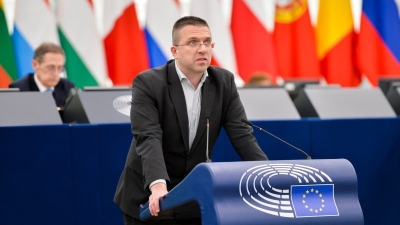Netanyahu delays bid to overhaul Israel’s judiciary as protests rage

Israel’s prime minister, Benjamin Netanyahu, said he was delaying his government’s campaign to exert greater control over the judiciary, backing off in the face of furious public protest that has plunged Israel into one of the deepest crises in its history. In recent weeks, Mr Netanyahu had been unyielding in his pursuit of the court overhaul, even as protests drawing hundreds of thousands have erupted across the country. On Sunday, he fired his defence minister for even suggesting that the plan be delayed. But on Monday, with civil unrest at new heights, with work stoppages hitting hospitals, airports and schools, and with dissent growing in the military, he relented — if only for the moment. The concession came as Itamar Ben-Gvir, the head of a powerful far-right political party in Mr Netanyahu’s governing coalition, said he was open to delaying a parliamentary vote on overhauling the judiciary, giving Mr Netanyahu some breathing room as protests ground the country to a halt. [ Dozens of Israeli reserve pilots refuse to train in protest against judicial overhaul ] By backing down, Netanyahu may be able to restore calm to the streets, but he now risks destabilising the political coalition that he laboured to assemble, finally forming a government in December. Many of his hard-right government partners had dug in their heels at any suggestion of a delayed vote. Even as he relented on the timing, Mr Ben-Gvir made it clear that he was not giving it up. “The reform will pass,” he said, “no one will scare us”. The Israeli opposition parties appeared to be split over Netanyahu’s offer of dialogue. While Yair Lapid, a former prime minister and the centrist leader of the opposition, welcomed it, if warily, Merav Michaeli, the head of the centre-left Labour party, rejected it. “How many more times can we fall into the trap of cooperating with Netanyahu?” Ms Michaeli said, accusing him of “buying time at the expense of our democracy”. The protesters, too, seemed unpersuaded. “So long as the legislation continues and has not been shelved, we will be in the streets,” an informal protest body known simply as “the struggle HQ” said in a statement. “This is another attempt to weaken the protest.” Still, after the Netanyahu announcement, the head of Israel’s main labour union called off a general strike planned for Tuesday. — This article originally appeared in The New York Times. 2023 The New York Times Company
LGBT+ people scrambling to find ways out of Uganda before anti-homosexuality Bill signed into law
Profile: Isaac Herzog could serve as ‘honest broker’ to dampen down Israel’s strife
:quality(70)/cloudfront-eu-central-1.images.arcpublishing.com/irishtimes/22YNK5SDBMFBFJYO2HNHECU3AE.jpg)
Humza Yousaf’s most pressing challenge is to hold off an expected Labour Party surge
:quality(70)/cloudfront-eu-central-1.images.arcpublishing.com/irishtimes/NY7GDAGWQIM2Y6AQKBSEEVLDJA.jpg)
War heroes or paid criminals? Russia struggles to deal with slain mercenaries
:quality(70)/cloudfront-eu-central-1.images.arcpublishing.com/irishtimes/UTHSY3KFKST6OH5U6OMFRCGHXA.jpg)
:quality(70)/cloudfront-eu-central-1.images.arcpublishing.com/irishtimes/ELCRE7WXE4UMPTHFZOQAP7WJ2E.jpg)
:quality(70)/cloudfront-eu-central-1.images.arcpublishing.com/irishtimes/NOK36SITLQ2QTZCUU3IVB5MCUE.jpg)



